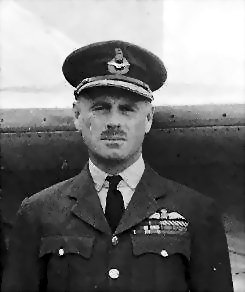Fielden, Edward Hedley "Mouse"
- Date of birth:
- December 4th, 1903
- Date of death:
- November 8th, 1976
- Nationality:
- British
Biography
Shortly after transferring to the Reserve of RAF Officers Fielden was chosen by the Prince of Wales (Later King Edward VIII) to be his private pilot. This involved piloting the Prince's private aircraft, and being responsible for it's maintenance. As the Prince's pilot, Fielden, known as 'Mouse' was a member of the Prince's staff, having retired from the RAF, and all the aircraft he flew and maintained during this period were registered in his name on the civil register, whilst remaining the property of the Prince. - The Prince of Wales held the RAF rank of Air Chief Marshal but with the death of King George V on 20 Jan 1936 and the Prince's accession to the throne as Edward VIII, he became a Marshal of the RAF. As such he was entitled to a communications aircraft provided at public expense. It was therefore decided to replace the new Monarch's own aircraft with an Airspeed Envoy (still civil registered) and place it on official inventory by allocating it to a new unit to known as 'The King's Flight'. At this point, 'Mouse' Fielden was appointed an Equerry in Waiting and at the same time promoted to Wing Commander. - With King Edward's abdication and succession by his brother King George VI, Fielden was confirmed in his appointment and continued as Capt of The King's Flight. The King's Flight continued to operate after the outbreak of WW2 but in early 1942 it's aircraft was absorbed into No 161 Sqn with Fielden as it's commander. 161 Sqn's role was that of delivering and picking up agents from within enemy occupied territory. These flights involved deep penetration flights on dark nights at low level into landing sites, often of unknown quality. Although the King's Flight as such had ceased to exist with royal flights being transferred to No 24 Squadron, Fielden maintained his appointment as Captain of the King's Flight. - As such he continued to accompany His Majesty when he flew taking time off from his duties as OC No 161 Squadron and later, when he was succeeded by Charles Pickard as Station Commander, RAF Tempsford. With the end of World War Two, it was pointed out to the King that air travel would become even more necessary in the future and so in May 1946 the King's Flight was reformed with Fielden once again at the helm as Capt, by now promoted to Air Commodore. Following the King's death in 1952, the Flight was renamed The Queen's Flight. Air Commodore Fielden remained as Capt of the Queen's Flight until he retired on 1 January 1962, when he was promoted to Air Vice Marshal and appointed Senior Air Equerry to The Queen.
Pre- and postwar decorations:
AFC - 1 Mar 1929
MVO - 30 Oct 1936
CB - 1 Jan 1946
GCVO - 8 Jun 1968
Promotions:
January 14th, 1924: Pilot Officer (probation)
July 14th, 1924: Pilot Officer
August 14th, 1925: Flying Officer
November 1st, 1929: Flight Lieutenant
July 22nd, 1936: Squadron Leader
January 1st, 1943: Temprary Group Captain
February 12th, 1945: Acting Air Commodore
August 12th, 1945: Group Captain (war sub)
? Air Commodore
February 1st, 1952: Air Vice-Marshal
Do you have more information about this person? Inform us!
- Period:
- Second World War (1939-1945)
- Awarded on:
- March 17th, 1941
- Period:
- Second World War (1939-1945)
- Rank:
- Group Captain
- Unit:
- No. 161 (Special Duties) Squadron, Royal Air Force
- Awarded on:
- April 6th, 1943
"This officer has flown on various operational missions, some of a most hazardous nature. He has displayed a high standard of operational efficiency, setting an example which has contributed materially to the high morale of the air crews under his command. His great organising ability has proved a valuable asset.”
- Period:
- Second World War (1939-1945)
- Rank:
- Group Captain
- Awarded on:
- June 24th, 1943
- Period:
- Second World War (1939-1945)
- Awarded on:
- January 1st, 1945
Sources
- - VERITY, HUGH, We Landed By Moonlight, Crecy Publishing, 1998.
- Second Supplement to The London Gazette Issue 35966 published on the 2 April 1943
- The London Gazette Issue 36077 published on the 2 July 1943
- Air of Authority
- Antiqbook





